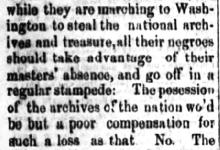From the N.Y. Times.
How the Deed is to Be Done.
Although threats of dissolving the Union have been common enough at the South, we have never yet seen any plan proposed for carrying these threats into execution; and the difficulty of accomplishing such an object, even it it was desired by a majority of the people, has been regarded as one of the great safeguards of the Union. But Bully Brooks, of South Carolina, in his speech to the citizens of Columbia, has, in a few words, foreshadowed the method of proceeding, and instructed the South in the art of Union breaking. In the event of the election of Fremont to the presidency by a majority of the people, an event which now seems hardly questionable, "the people of the South," says Brooks, with the bold air of a Bobadil, "on the 4th of March next, sho'd rise in their might, march to Washington, and seize the archives and treasury of the Government." This plan certainly has the merit of boldness and simplicity; but, even if it should be carried out, we still do not see that the object of the South wo'd be accomplished. The loss of the national archives are not absolutely necessary to the preservation of the Union; and, as to the small amount of treasure which the people of the South would find in Washington, its losses would not for a moment be felt. The Union might be very easily preserved without it. But there are two difficulties in the way, which might prevent the treasonous plan of the South Carolina Bobadil from being carried out.––In the first place, we imagine that the people of the South, for white people are the only ones who would engage in such an undertaking, would find themselves in a very unpleasant dilemma, it, while they are marching to Washington to steal the national archives and treasure, all their negroes should take advantage of their masters' absence, and go off in a regular stampede: The possession of the archives of the nation wo'd be but a poor compensation for such a loss as that. No. The necessity the people of the South are under to watch their slaves will prevent them from ever marching to Washington, except in small squads, in pursuit of offices. But, even though the South sho'd attempt to commit a burglary on so grand a scale, the other difficulty would be in overcoming the Union men of the North, who would certainly be on hand to prevent any such burglarious attempts from being carried into execution.
Brooks' speech must have the effect to make our dough-faced Union savers blush to think that the ribald blustering of such vaporing bullies, should ever have awakened in their minds the thought the Union was in danger from such disaffection. It is to conciliate the Brookses of the South that the men like Rufus Choate have abandoned their political confederates to serve in the rans of the Buchaniers. There never was before so humiliating and senseless a desertion of principle. For the sake of the Union to abandon the conservative Union men of the North to herd with the avowed disunionists of the South.
Fanatical and insane as the speech of Brooks sounds to Northern ears, and calculate as it is to excite laughter rather than anger and alarm, yet it must be remembered that the is the honored and favorite son of the South, and that the treasonable nonsense which he utters is applauded and approved by them.
Preparations are making for giving him a public dinner in the Edgefield District, and the Banner says of his speech at Columbia:
"As to the line of policy he recommends to the people of the State, we believe it is founded in wisdom and moderation, and entitled to their adoption."
The "line of policy," which he recommends is simply that of treason and disunion.
"How the Deed is to Be Done," Brookville (IN) Indiana American, September 19, 1856, p. 4

